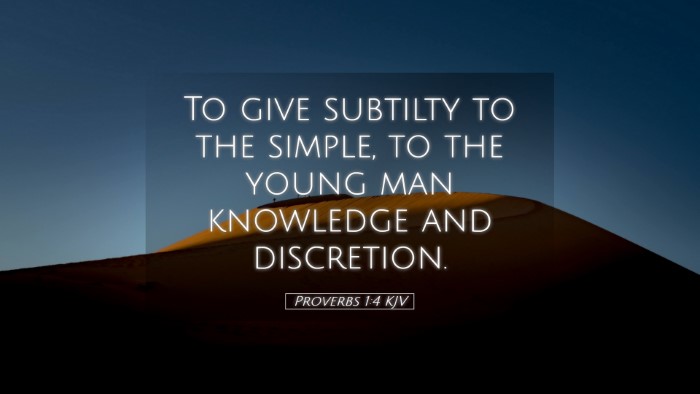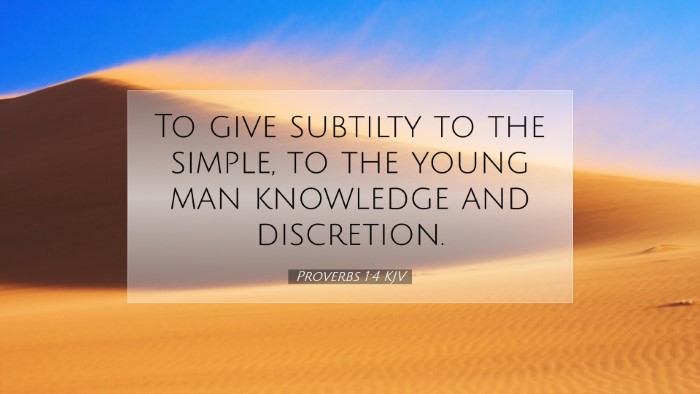Commentary on Proverbs 1:4
Proverbs 1:4 states: "To give subtilty to the simple, to the young man knowledge and discretion."
Introduction
This verse introduces the purpose of the Proverbs, setting the stage for a deeper exploration of wisdom's effects on life. The author, traditionally believed to be Solomon, aims to impart wisdom that is accessible yet profound. Highlighting the target audience—the simple and the young—provides insight into the inherent theme of education and moral instruction.
Audience of Wisdom
The verse identifies two groups that wisdom aims to reach:
- The Simple: This term refers to those who are naïve or lacking discernment. The wisdom of Proverbs is designed to elevate the simple from ignorance to understanding.
- The Young Man: Young individuals are particularly susceptible to influences and decisions that shape their character. Wisdom aims to imbue them with knowledge and discretion, crucial for navigating life's complexities.
Definitions and Insights
Several key terms in this verse warrant exploration:
- Subtilty: Derived from the Hebrew word "תָּבוּן" (tavun), it indicates prudence or subtle insight, going beyond mere knowledge to encompass wise action.
- Knowledge: Refers not only to information but also to a profound understanding of life and moral truths.
- Discretion: This term implies the ability to make wise judgments and decisions, essential for leading a righteous life.
Commentary Insights
Matthew Henry's Commentary emphasizes that Proverbs, particularly in this verse, is practical wisdom for living. He notes that the purpose of these wise sayings is to guide the youthful towards wise behavior and sound judgment. Henry also stresses the importance of humility in accepting this counsel, especially for those who might initially consider themselves wise.
Albert Barnes points to the transformative power of wisdom. He notes that wisdom's teachings serve as an antidote to the foolishness that often accompanies youth. Barnes emphasizes that the 'simple' are not inherently condemned but can be directed towards a path of discernment and understanding through the wisdom found in Proverbs.
Adam Clarke explores the notion that wisdom is not merely intellectual but also practical. He articulates that the goal of imparting wisdom is not to fill one's mind with information but to cultivate a life of character and righteousness. Clarke highlights that discretion and knowledge work in unison to equip the young with the ability to navigate moral complexities and societal challenges.
Theological Implications
This verse offers significant theological considerations:
- Divine Instruction: The act of offering wisdom to the simple reflects God's grace and desire for humanity to grow in understanding. It showcases God’s loving initiative to guide His creation.
- Growth in Faith: Just as physical growth requires nourishment, spiritual growth hinges on the intake of wisdom. This passage invites young believers to seek knowledge as a pathway to deepening their faith.
Practical Applications
For pastors, students, and theologians, Proverbs 1:4 serves as both a reminder and a call to action:
- Mentorship: Emphasize the necessity of mentoring young individuals within congregations. Teaching them to be discerning and wise is paramount for their spiritual and moral development.
- Teaching Wisdom: Incorporating the teachings of Proverbs into sermons and lessons can provide foundational insights that help shape the lives of the congregation.
- Personal Reflection: Encourage self-examination and the continuous pursuit of wisdom and understanding as markers of spiritual vitality.
Conclusion
Proverbs 1:4 encapsulates the essence of wisdom as a guiding force in life, inviting the simple and the young towards a richer, more discerning existence. By understanding and applying these foundational truths, believers can cultivate discernment that leads to a wise and fulfilling life.


